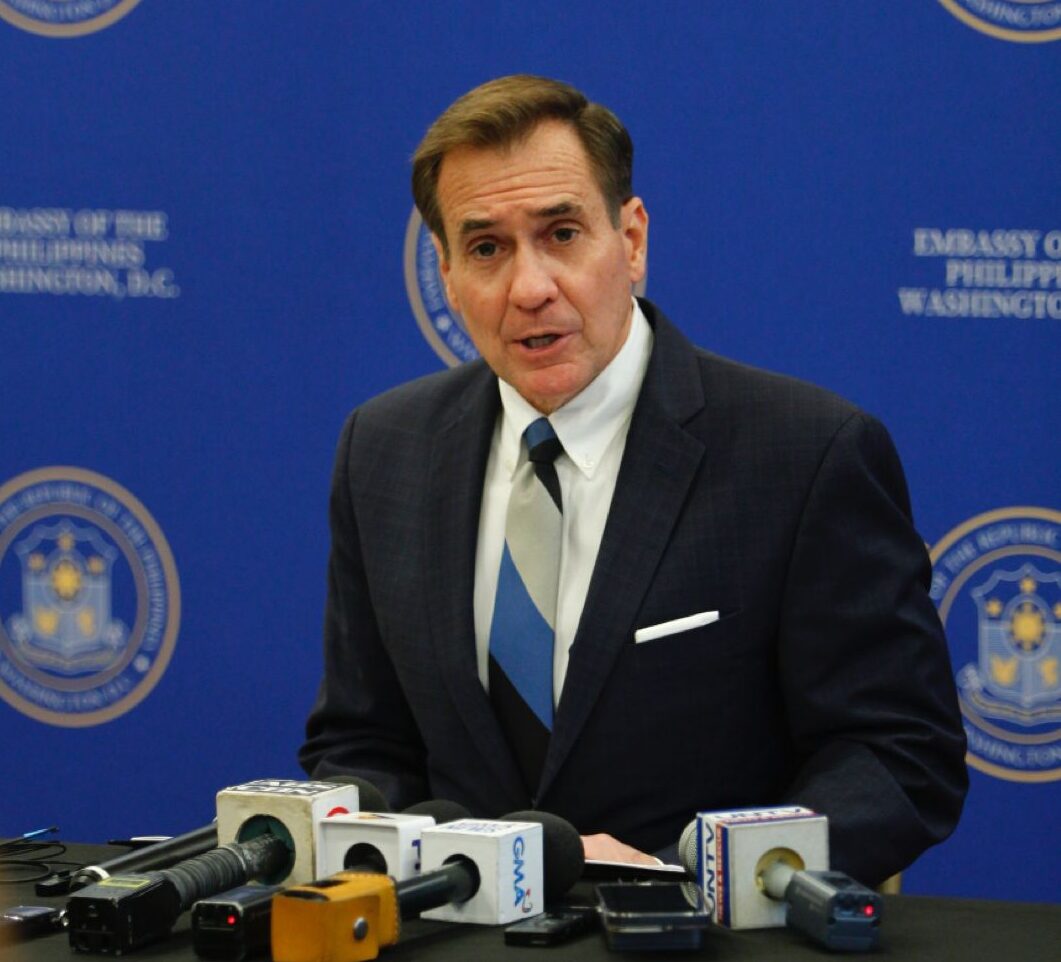
US National Security Council Coordinator for Strategic Communications John Kirby answers questions from Filipino reporters in Washington, D.C., United States, on April 10, 2024, a day before the first-ever trilateral meeting between the Philippines, United States, and Japan. Gabriel P. Lalu/ INQUIRER.net
WASHINGTON, D.C., United States — While the US is concerned and has monitored the rising tensions over the South China Sea, a ranking official said it would be wrong to assume the trilateral summit with the Philippines and Japan would only be about the maritime row.
Instead, US National Security Council Coordinator for Strategic Communications John Kirby said in a press briefing at the Philippine Embassy here on Wednesday (Eastern time) that a wide array of topics are on the table — economic partnerships and strengthening ties between the three countries.
“It’s easy to look at all this and I understand the desire to do it, with an eye towards China — and I’m not suggesting that. The tensions in the South China Sea are important and that we are concerned. I know President [Joe] Biden is concerned about what we’re seeing in the PRC (People’s Republic of China) particularly in the South China Sea and these claims that they’re trying to pursue,” Kirby said.
“But what we’re really after in tomorrow’s meeting — both bilaterally and trilaterally — is deepening our partnerships for the good of the partnerships, for the good of the American people, the Japanese people, and certainly the Filipino people. It is not just — and you shouldn’t take away that these discussions are just all about China and or all about how to counter their growing aggressiveness,” he added.
READ: What to expect from Philippines, US, Japan’s first trilateral summit
According to Kirby, it is easy to think that the first-ever trilateral meeting between the three countries was borne out of the South China Sea tensions, but he reminded the public that the Philippines and Japan are treaty allies of the US — which means that Washington has commitments to Manila and Tokyo that it needs to fulfill.
“Yes, that’s a piece of it, but I would ask you to look at it from a more strategic perspective. These two countries, the Philippines and Japan are treaty allies of the United States and we take our treaty commitments very, very seriously. But our relationship is bigger than that,” Kirby said.
“I mean, it’s very easy to get hung up on defense relationships — important as they are, but we shouldn’t get hung up on that. There’s a lot more to discuss there, and there’s a lot more purpose to these meetings than just about what we’re doing to react to PRC aggression,” he added.
Kirby also said the three leaders will announce key investments after their meeting — proof that the discussions go beyond security issues.
“Our national security advisers met in Tokyo last June to initiate this trilateral cooperation, and officials from across our three governments had met on topics as varied as economic security, and maritime cooperation. For example, (US Commerce) Secretary (Gina Marie) Raimondo will host her economic minister counterparts Thursday morning for a discussion on enhancing trilateral trade and investment,” he said.
“On Thursday the leaders will announce new initiatives to accelerate and surge high-quality infra investment in the Philippines to enhance energy security, to deepen maritime cooperation, and to strengthen partnerships on technology and on cybersecurity,” he added.
The pursuit of stronger relations between the US and the Philippines will be part of discussions when Marcos, Biden, and Japanese Prime Minister Kishida Fumio meet for the trilateral meeting on Thursday, April 11.
However, it has been made clear that tensions over the West Philippine Sea — including China’s aggressive actions against Filipino vessels — will be a key talking point.
Tensions over the West Philippine Sea have been high recently, with the Philippine Coast Guard (PCG) complaining about the Chinese Coast Guard’s (CCG) continued harassment of Filipino ships assisting resupply missions to troops stationed in Ayungin Shoal.
READ: PH vessel sustains ‘heavy damage’ in Chinese coast guard attack
On April 6, PCG spokesperson Commodore Jay Tarriela said the CCG again fired water cannon at a Philippine vessel. The incident happened on April 4 near Rozul Reef, which is within the Philippines’ exclusive economic zone (EEZ).
China has constantly claimed they own Ayungin Shoal even if it is within the Philippines’ EEZ. China said a former Philippine president promised to remove BRP Sierra Madre from Ayungin Shoal, but Marcos said he is not aware of such a deal.